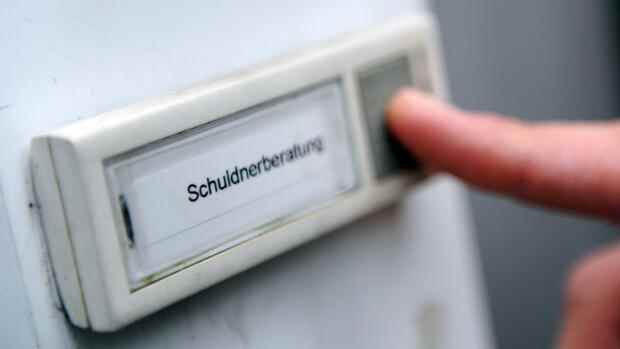Berlin According to experts, the sharp increase in energy prices will significantly worsen the economic situation for many private households. The head of Creditreform’s economic research, Patrik-Ludwig Hantzsch, told Handelsblatt: “The additional burdens are already serious.” But now it’s getting even worse.
“Life is becoming more expensive across the board.” Rising inflation will significantly exacerbate the over-indebtedness situation. “In some cases, this will also lead to an increase in personal bankruptcies,” said Hantzsch.
Peter Kenning, Chairman of the Advisory Council for Consumer Affairs in the Ministry of Consumer Protection, is also sounding the alarm. The risk of insolvency could be particularly high for households that have low incomes and heat with gas, Kenning told the Handelsblatt.
The assessments are consistent with current figures on consumer sentiment. The barometer of the GfK market researchers in Nuremberg signals a surprisingly sharp drop of 5.6 points to minus 36.5 points for September. Since the consumer mood survey for Germany as a whole began in 1991, no worse value has been measured.
“The sudden increase in the propensity to save this month means that the consumer climate is continuing its steep descent. It has once again reached a new record low,” said GfK consumer expert Rolf Bürkl.
Top jobs of the day
Find the best jobs now and
be notified by email.
Banking economists see no improvement in the situation in the foreseeable future. “Consumerism is becoming consumer frustration,” said Andreas Scheuerle from Dekabank. Alexander Krüger, chief economist at Hauck Aufhäuser Lampe Privatbank, sees consumer mood slipping further and further into the ice age. “A change in mood is somewhere in nirvana, the gas levy will not be the last burden,” he said.
Ampel is working on the third relief package for companies and citizens
Creditreform expert Hantzsch also sees the gas levy as only part of the burden that consumers are confronted with. “Energy costs are already at a high level,” he said. This does not apply to gas, but also to electricity. “In addition, a strong cost driver, the ancillary cost bills, have not yet reached consumers.”
At the same time, Hantzsch emphasized that the economy was also affected by the high prices. “After two years of Corona, some companies are already pretty worn out,” he said. Many would have left equity. “What makes us think: In Austria, for example, many of the state’s corona aid measures were canceled – with the result that company insolvencies have risen by more than 120 percent.”
In Germany, however, there will not necessarily be a wave of insolvencies, the insolvency expert added. Nevertheless, the difficult economic situation could hit small and medium-sized companies in particular. With the corresponding impact on consumers. “In the case of company bankruptcies, jobs are lost,” said Hantzsch. This also affects the employees concerned.
Against this background, Hantzsch sees the “demand for economic policy as it has not been for many years”. “Politicians must carefully consider how they can help.”
>> Read also: Up to 12,000 euros a year: That’s how expensive it is now to heat a house with gas
The traffic light coalition of SPD, Greens and FDP is currently working on a third relief package for companies and citizens because of the high energy prices. This should include tax relief and targeted help for people on low incomes and a housing benefit reform.
Criticism of Lindner’s plans to reduce cold progression
Creditreform expert Hantzsch said there was no way around targeted and permanent relief for citizens. Individual measures, on the other hand, are “symbolic politics” and do not have a lasting effect. “The crises we are dealing with are not short-lived,” emphasized Hantzsch.
>> Read also: “Rents will go up due to inflation” – These cities have the highest rental yields
The expert pleaded for a tax reform. “Breaking down the cold progression is a right measure to actually have a lasting effect,” he said. However, more is possible under tax law. “You could permanently lower the VAT for certain consumer goods.” In the income tax scale, the cold progression can mean that a salary increase leads to higher taxation even if it is actually minimized by inflation.
Federal Finance Minister Christian Lindner (FDP) wants to change that. For his plans to compensate for cold progression, he has estimated a volume of ten billion euros, which he says would benefit 48 million people. The plans were criticized by politicians from the SPD and the Greens as being socially unbalanced.
With the sharp rise in inflation, concerns are growing about an increase in over-indebted private households.
(Photo: dpa)
From the point of view of SPD leader Saskia Esken, the planned third relief package should support people and families with low and middle incomes as well as pensioners. “We have to help those who cannot help themselves and who have no reserves,” said Esken on Friday in the ZDF “Morgenmagazin”.
Government adviser Kenning explained that if it were possible to take administrative action on particularly burdened households, “one could help here with another one-off payment”. If you want to make the border fluent, you can also stagger the payments according to income. “This could possibly be financed from the tax revenue resulting from the gas levy.”
More: “A wave of lawsuits cannot be ruled out” – The legal pitfalls of the gas surcharge

